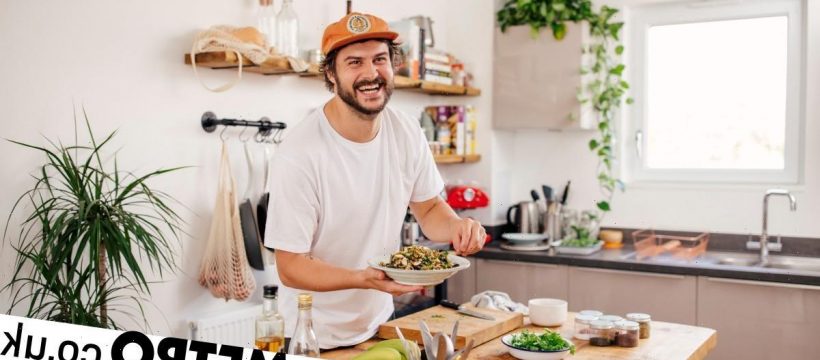At a time when we are tightening our belts and cutting down on luxuries we can no longer afford, it’s shocking to learn that the average UK household spends over £700 a year on food that goes in the bin.
That equates to a staggering 6.6million tonnes of edible food wasted in homes every year.
‘Food waste is a massive issue,’ says TikTok chef Martyn Odell, aka the Food Waste Disruptor who runs digital courses to cut down on food waste.
‘It impacts on our pockets and the environment as wasted food is also wasted energy, resources, labour and transportation.
‘A few changes in the way we organise our kitchens, shop and cook can play a huge role in saving us cash, and saving the planet.’
Here are his top tips:
Organise your food store
Have a rummage at the back of the fridge and kitchen cupboards to see what you have to play with. Then you can use what you have, and won’t keep buying more of the same. Combine half used packs of ingredients like nuts, pasta and flour.
A best before date is only a guide, it doesn’t mean it’s gone off, it just won’t be at peak deliciousness. Use your common sense and if you don’t want the ingredient give it to a mate or share it on apps like Olio.
Perishable vs non-perishable
Perishables like fruit and veg are the ticking time bomb of food waste. Most will have a shelf life as little as three days so this stuff needs your attention.
The dry store is the backbone of your kitchen and will help you make amazing meals simply by plugging in the fresh ingredients that need using up – just use your imagination – a simple tomato pasta made from tinned tomatoes works wonders with charred broccoli that’s on the turn.
Plan
Plan your week in days – think about the meals you want to cook and what you need to buy and make a list on your phone. This doesn’t need to be militant.
If you have a chaotic and unpredictable life like me, then a plan can be as simple as what days will I be at home this week. Buy on an ad-hoc basis as you need – having a full fridge of food that is likely to go off won’t win you any medals.
Shop smart
Only buy the ingredients on your list. Don’t shop hungry or you’ll fill your trolley with things you have a sudden hankering for but won’t use.
If you get tempted by something on special offer, don’t buy it unless you have a plan for it. Don’t automatically buy carrots when you still have some in the fridge that would make a delicious soup or stew.
Cook up
Staggeringly, 41% of food is wasted because it wasn’t used in time – 4.4m potatoes wasted every day in UK homes because they are a cheap commodity.
So treat every ingredient like a black truffle – one of the most expensive ingredients in the kitchen. A quarter of household waste is generated because we cooked, prepared, and served too much. Calories are a fantastic base to understand personal portion control.
Reuse, recycle, compost
Has anyone ever cooked the right amount of pasta? If you have leftovers stick it in the freezer for another day. Roasted too many veggies for dinner? Use the next day as a burrito filling, curry, or add to a simple salad.
Your goal is to stop food from going into the bin. Get clever and use your imagination; turn veg peels into crisps by roasting them in a little oil and experiment with pickling veg like beetroot with homemade vinegars.
Be realistic
If you are going off-track, reset and see what part of the process is going wrong. You may need to be honest and accept that you love a takeaway three times a week. Perfection isn’t the solution – trying is! It takes practice so give yourself a couple of weeks to make changes.
Forget perfectionism
It’s counterintuitive (and expensive) to shop organic, seasonal, fair-trade food and then waste it.
Produce that reduces carbon footprint is great for the local economy, biodiversity and human rights but let’s focus on the key thing that we’re really trying to resolve first: reducing waste.
You can still play a role in the impact food waste has on the planet even if you can’t afford chard from an organic farm.
Enjoy the process
You don’t have to be all weird and hippy about creating less waste. Get the kids involved, make it a family activity. Food is such a huge part of all our lives we need to enjoy it.
Think of how you can make better choices moving forward like eating seasonal foods, buying from local producers and reducing plastic packaging. We don’t need to be perfect, we just need to be better.
Source: Read Full Article


